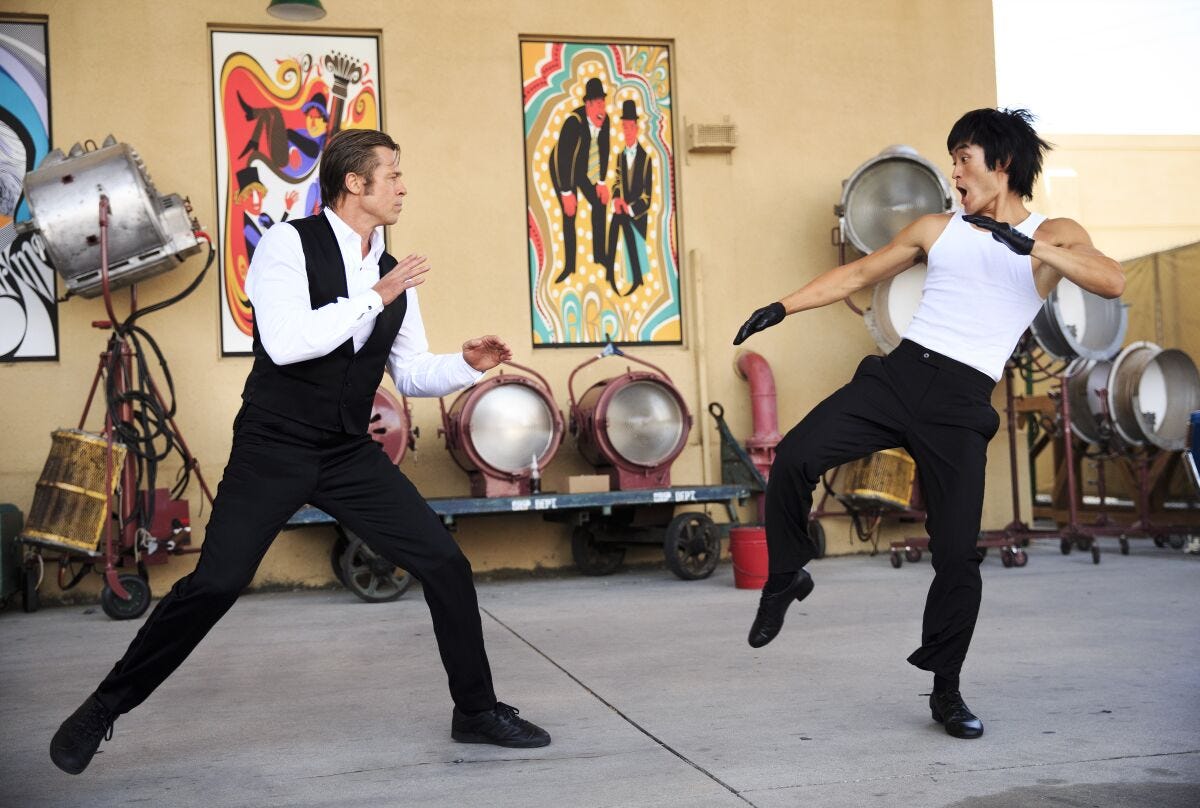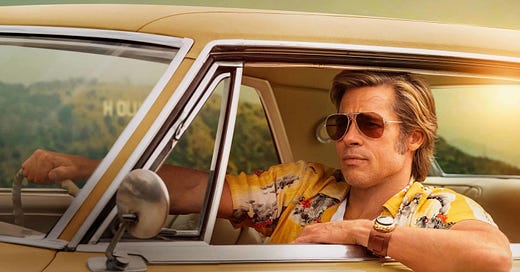‘It’s Called Manslaughter’: Cliff Booth and Solid Character Work
In “Once Upon a Time in Hollywood,” Quentin Tarantino does some masterful showing without telling.
Writing is hard1. Crafting a believable story populated by believable characters ain’t easy; if it was, believe me the corporate overlords of this world would spare themselves the trouble of paying people like me to create stories for them2. One of the biggest challenges in writing stories are those pesky characters—a lot of stories that are otherwise perfectly fine are filled with characters that are just names and brief descriptions on the page. Making them have some sort of inner life isn’t easy.
Films have it a little easier because the actors can imbue even the thinnest character with a semblance of inner life simply by being their normal, charming selves3. But even in films and TV shows there are stories that work because of the characters and stories that work in spite of the characters. I started thinking about this recently after re-watching Once Upon a Time in Hollywood, written and directed by Quentin Tarantino and starring Brad Pitt and Leonardo DiCaprio as stunt person Cliff Booth and fading actor Rick Dalton, respectively.
Quentin Tarantino seems like the sort of guy who would be exhausting to talk to in person4, but he man sure does know how to make a movie. Sure, his occasional foot fetish and staunch belief that he has an N-word pass can be a bit off-putting, but his films are always interesting, in large part because he almost effortlessly creates characters who feel real on the screen. He does this with a remarkable lack of “telling”—he rarely, for example, has other characters tell the audience stuff about a character5. Instead he opts to show us who the character is through their actions and statements. This is, of course, how you’re supposed to do it, but a lot of writers try to get away with lazier approaches, which makes Tarantino’s subtler approach often stand out.
I started thinking about this after watching a specific scene: The scene where Cliff Booth and Bruce Lee (Mike Moh) trade insults and get into a fight. Because it’s all about showing and not telling.
You know, You're Kinda Pretty for a Stuntman

For reference, here’s the scene in question:
For the purposes of this essay, we’re going to treat Bruce Lee as a fictional character. Lee’s family has expressed anger about what they say is a misleading and inaccurate depiction of the man, and I don’t know enough about Lee to have an informed opinion on that, and this film is certainly not a documentary.
At this point, Rick Dalton is guest-starring on The Green Hornet and has gotten his buddy Cliff a bit job as his stunt double, and Booth is hanging out with some cast and crew on the lot6. Whether or not it’s historically accurate, Lee’s speech serves to crystallize the character immediately: We’ve all known blowhards who like to damn with faint praise, evincing a “reasonable” and generous nature that’s actually all about how great they are. The dialog is terrific: He starts off by saying he admires Cassius Clay (Muhammad Ali), then does this beautiful little pivot to saying he admires his sport—suddenly it’s not Clay he admires at all. A second later, he denigrates the sport he just claimed to admire when he says it has an “element” of true combat—it’s not really true combat, it just has an element of it.
Whatever the real Bruce Lee was like (in reality, he revered Ali and thought the boxer would “kill” him in a fight simply because he was so much larger and stronger), the fictional Bruce Lee is an asshole, that’s clear from these first few sentences. In the background, you can see Cliff coming to this precise conclusion, his face an expression of increasingly amused disbelief as he listens7. Just as you, the audience, is getting sick and tired of listening to Lee brag about how dangerous he is, Booth interrupts with a scoff and the conflict is introduced. Importantly, Tarantino has positioned Booth as the hero of this scene.
The idea that a character can play different roles within one story gets missed sometimes. Booth is not the hero of the overall story—in fact, he’s kind of a creep, a guy leeching off his actor buddy, a guy who probably murdered his wife, a guy who seriously considers accepting sexual favors from an underage girl and only refuses because of the potential jail time. But he is the hero of this scene, which is a mini-narrative within the larger story. He’s the hero because we’re all thinking that Fictional Bruce Lee is an asshole, but Cliff actually says it. And then proceeds to teach Fictional Bruce Lee a lesson—and the way he teaches that lesson is another terrific character moment.
Not Bad Kato. Try That Again

There’s another nice character moment when Lee sets up the fight and goes to hand over his costume and glasses. He’s surprised to learn that Cliff Booth has a reputation, because Fictional Bruce Lee, asshole extraordinaire, never thought for one second that a middle-aged stuntman cooling his heels on a back lot might be someone to worry about8.
But Cliff Booth is shady, kids. Tarantino has communicated this throughout the film by showing how reluctant people are to work with him, how many people simply regard him as an asshole, how lonely and empty his life is—how delighted he is to kick ass when the Manson cult fucks with him at the Spahn Ranch. Cliff Booth is an asshole, but he’s smart, and it’s telling how he manages his fight with Lee.
The first round goes to Lee. Pretty decisively, actually, putting Booth on his ass. But Booth immediately begins to grift Lee, goading him and using his arrogance against him. He taunts him, calling him by his character’s name and tricking him—try that again9. When Lee does just that, repeating the move, Booth is ready for it, and sends Lee sailing into a car. It’s not because Booth is a better fighter. It’s because Lee has shown him the move and then tries it again, and all he has to do is move at the right time.
It tells you everything you need to know about these characters: Fictional Bruce Lee is an arrogant jerk, and Cliff Booth is a sneaky prick. And no one had to tell you any of this—hell, you didn’t even need to see the rest of the movie. It’s all there in the actions and statements of the characters in this one scene.
Do I hope that someday someone writes me into a story and creates an asshole Fictional Jeff Somers? Sure do. Except it won’t be all that fictional, will it?
Next week: Barbarian and the link between horror and mystery.
As I keep trying to tell y’all, I am the real hero here.
Soon AI will be writing all your novels and filmed entertainments and you bastards won’t even notice me begging for spare change on the sidewalk in the cold, will you?
The amount of charisma a sociopath like Brad Pitt exudes is almost supernatural. By contrast, the amount of charisma I exude usually leads to me not being invited to things.
I once watched an interview with a coked-up Tarantino and suffered a stroke halfway through. Saw god, came back and decided to drink more whiskey.
There’s a future essay in Tarantino’s use of Telling—specifically the way he introduces exposition into his films via straightforward narration in order to explain concepts. But that is not this essay.
Drinking milk—once you notice that Brad Pitt always has his characters eating or drinking something as a bit of business to give them something to do when they’re just standing or sitting around, you can’t unnotice it. I see it in my dreams at this point.
Which is rich, because Cliff himself is something of a monumental asshole. But take it from me, a certified asshole himself—we assholes can smell each other from a mile away.
Similarly, I regard all of you as faceless homunculi until you say something out loud, startling the crap out of me.
As someone who grew up on the gritty streets of Jersey City wearing glasses the size of the Moon, I know a thing or two about the tricks of not getting your ass kicked.





Thanks for the post! Great example of show vs. tell and great movie overall.
Thank you. That was amazing. Now I have to go out and see which of my local libraries have that movie.